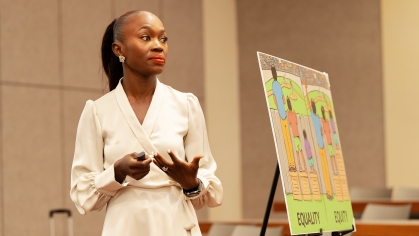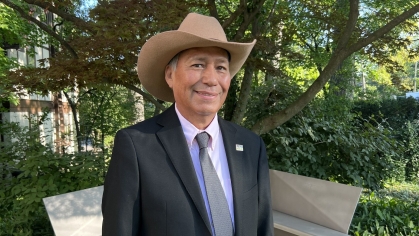The Newark-based Rutgers Center for Transnational Law (CTL) is accepting applications for summer 2023 internship placements in human rights organizations throughout Latin America. Students interested in international law and traveling abroad but living like a local are encouraged to apply. This internship program allows students interested in human rights to put their burgeoning legal skills to work within leading non-governmental organizations throughout Latin America.
“Any good lawyer must be able to provide legal and policy responses to current social problems, whether you are based in the United States or somewhere else,” says Jorge Contesse, of Rutgers Law School and CTL Director. “What makes this experience so valuable is the exposure to other legal and social cultures. There’s no way you can experience something like this but to actually go and work in that culture, even if it’s only for a summer.”
Applications for Summer 2023 internships are due on March 1. Last year, one Rutgers Law student spent the summer in Colombia while another interned in Chile.

Zohar Hasson had already done a lot of work in support of the LGBTQ+ community. He was an intern at the Human Rights Campaign, a volunteer at the Newark LGBTQ Community Center, and a research assistant for one of his professors working on issues like discrimination, parenthood, Title VII, and more. When he discovered the opportunity to travel to Latin America and work on these same issues, he jumped at it.
“I wanted the opportunity to be immersed in another culture, and I chose Colombia because the host organization was Colombia Diversa, which is the nation’s largest LGBTQ nonprofit,” he says. “When I saw that, I couldn’t stop thinking about it.”
Hasson spent one month in Bogotá, researching and writing about American case law that could be applied in Colombia. He researched legal protections for LGBTQ people in the workplace and public spaces like stores and restaurants. “The organization started with the goal of legalizing same-sex marriage in Colombia,” he says. “Now that it’s legal, they’re focusing on next steps like protecting LGBTQ individuals against discrimination and even murder.”
In addition to gaining the unique experience of living and working in another country, the internship allowed Hasson to immerse himself in a totally different legal system. “I’m in the process of becoming a citizen of Spain, and may have the opportunity to practice abroad again,” he says. “This internship has given me a taste of what that could be like.” More broadly, however, this opportunity opened his heart and mind to traveling the world and meeting new people. “It’s truly given me a new perspective on life,” he says. “I feel so much more connected to the mission of doing what makes me happy and gives meaning to life.”
Sarah Austino, who completed an internship in Chile last year, is no stranger to adventure. She's traveled abroad since the age of 17, has backpacked through Europe, and spent six months backpacking through Central America. When she touched down in Santiago for her internship, Chile marked the 40th country she’s visited. “I have a master’s degree in international relations and came to law school wanting to practice international law,” she says. “So this internship was a natural fit for me.”
Austino interned for Fundación Iguales, a nonprofit organization focused on human rights work. Specifically, she did comparative research on conversion therapy to help Chile move forward with a ban. She researched which countries have banned it and how, which have criminal charges in place, and which organizations worldwide are working to ban it. She also researched the other side of the argument: why some organizations don’t want conversion therapy banned.
While in Chile, Austino gained a new perspective on human rights work. “Fundación Iguales is such a small organization with just eight full time employees,” she says. “The director herself has made such a huge impact on marriage equality and they’re fighting now towards helping same-sex couples adopt and create a family unit. I realized you don’t have to be part of a big organization to make a huge change and have a big impact on people’s lives.” And, she’d recommend interning abroad to anyone interested in experiencing a new culture and making a difference. “Being involved in what local people are fighting for is invaluable,” she says. “You feel you're a part of something.”


